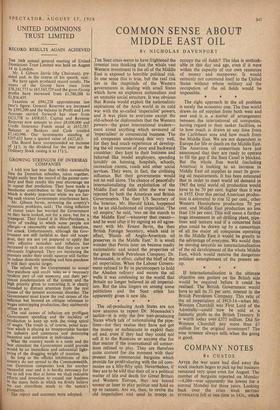COMMON SENSE ABOUT MIDDLE EAST OIL
BY NICHOLAS DAVENPORT THE Suez crisis seems to have frightened the investor into thinking that the whole vast Western investment in the oil of the Middle East is exposed to horrible political risk. In one sense this is true, but the real risk lies in the ineptitude of the Western governments in dealing with small States which have an explosive nationalism and an unstable social structure. It was obvious that Russia would exploit the nationalistic aspirations of the Arab world in its cold war with the so-called 'imperialist' powers, and it was plain to everyone except the old-school-tie diplomatists that the Western powers—the great international traders— must avoid anything which savoured of 'imperialism' in commercial business. The oil companies understood this very well, for they had much experience of develop- ing the oil resources of poor and backward countries : they kept to their business and behaved like model employers, spending lavishly on housing, hospitals, schools, recreation rooms, roads and other social services. They were, in fact, the civilising influence. But their governments would not let well alone. The chance of peacefully internationalising the exploitation of the Middle East oil fields after the war was rejected by both the American and British Governments. The then US Secretary of the Interior, Mr. Harold Ickes, happened to be an old-fashioned oil imperialist. 'The oil empire,' he said, 'was on the march to the Middle East'—whatever that meant— and he went after it by signing an oil agree- ment with Mr. Ernest Bevin, the then British Foreign Secretary, which said in effect, 'Hands off Anglo-American oil preserves in the Middle East.' It is small wonder that Persia later on became madly nationalistic and seized the properties of the great British Petroleum Company. Dr. Moussadek, in effect, called the bluff of the oil imperialists. When the Labour Govern- ment refused to fly in paratroopers to hold the Abadan refinery and secure the oil wells it was confessing to the world that Britain no longer believed in oil imperial- ism. But the idea lingers on among some politicians and the Suez crisis has apparently given it new life.
• a
The oil-producing Arab States are not now anxious to repeat Dr. Moussadek's tactics—it is only the few non-producing States which talk of nationalising the pipe- lines—for they realise they have not got the money or technicians to exploit their oil and, even if they had they could not sell it to the Russians or anyone else for that matter if the international oil consor- tium refused to play. They are therefore quite content for the moment with their present fine commercial bargains which provide for profit-sharing with the oil com- panies on a fifty-fifty split. Nevertheless, if they arc to be told that their oil is a political matter of life and death for Great Britain and Western Europe, they are bound sooner or later to play politics and hold us up to ransom. Are we, then, to revive the old imperialism and send in troops to occupy the oil fields? The idea is unthink- able in this day and age, even if it were within the capacity of our own resources of money and manpower. It would certainly not commend itself to the United States without whose military aid the occupation of the oil fields would be
impossible. •
The right approach to the oil problem is surely the economic one. The free world draws its oil supplies from both west and east and it is a matter of arrangement between the international oil companies, having regard to their tanker facilities, as to how much is drawn at any time from the Caribbean area and how much from the Middle East. We are not dependent in Europe for life or death on the Middle East. The American oil consortium have just announced that they are ready to operate to fill the gap if the Suez Canal is blocked. But the whole free world (including America) is looking to an increase in Middle East oil supplies to meet its grow- ing oil requirements. It has been estimated that in order to meet world oil demand in 1965 the total world oil production would have to be 70 per cent. higher than it was in 1955. Over this period American produc- tion is estimated to rise 32 per cent., other Western Hemisphere production 70 per cent. and Middle East production no less than 156 per cent. This will mean a further huge investment in oil drilling plant, pipe- lines and tankers and if a concerted field plan could be drawn up by a consortium of all the major oil companies operating in the Middle East it would be greatly to the advantage of everyone. We would then be moving towards an internationalisation of the oil development of the whole Middle East, which would remove the dangerous political entanglement of the present set- up.
If internationalisation is the ultimate objective one gesture on the British side would be required before it could be realised. The British Government would have to sell its 51 per cent. interest in the British Petroleum Company. This relic of the oil imperialism of 1913-14—when Mr. Winston Churchill was First Lord of the Admiralty—could now be sold at a fantastic profit to the British Treasury. It is worth today over £375 million. Did Sir Winston Churchill pay more than £5 million for the original investment? The wise investor always sells when the going is good.


































 Previous page
Previous page